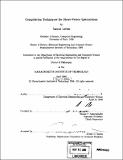Compilation techniques for short-vector instructions
Author(s)
Larsen, Samuel (Samuel Barton), 1975-
DownloadFull printable version (54.53Mb)
Other Contributors
Massachusetts Institute of Technology. Dept. of Electrical Engineering and Computer Science.
Advisor
Saman P. Amarasinghe.
Terms of use
Metadata
Show full item recordAbstract
Multimedia extensions are nearly ubiquitous in today's general-purpose processors. These extensions consist primarily of a set of short-vector instructions that apply the same opcode to a vector of operands. This design introduces a data-parallel component to processors that exploit instruction-level parallelism, and presents an opportunity for increased performance. In fact, ignoring a processor's vector opcodes can leave a significant portion of the available resources unused. In order for software developers to find short-vector instructions generally useful, the compiler must target these extensions with complete transparency and consistent performance. This thesis develops compiler techniques to target short-vector instructions automatically and efficiently. One important aspect of compilation is the effective management of memory alignment. As with scalar loads and stores, vector references are typically more efficient when accessing aligned regions. In many cases, the compiler can glean no alignment information and must emit conservative code sequences. In response, I introduce a range of compiler techniques for detecting and enforcing aligned references. In my benchmark suite, the most practical method ensures alignment for roughly 75% of dynamic memory references. (cont.) This thesis also introduces selective vectorization, a technique for balancing computation across a processor's scalar and vector resources. Current approaches for targeting short-vector instructions directly adopt vectorizing technology first developed for supercomputers. Traditional vectorization, however, can lead to a performance degradation since it fails to account for a processor's scalar execution resources. I formulate selective vectorization in the context of software pipelining. My approach creates software pipelines with shorter initiation intervals, and therefore, higher performance. In contrast to conventional methods, selective vectorization operates on a low-level intermediate representation. This technique allows the algorithm to accurately measure the performance trade-offs of code selection alternatives. A key aspect of selective vectorization is its ability to manage communication of operands between vector and scalar instructions. Even when operand transfer is expensive, the technique is sufficiently sophisticated to achieve significant performance gains. I evaluate selective vectorization on a set of SPEC FP benchmarks. On a realistic VLIW processor model, the approach achieves whole-program speedups of up to 1.35x over existing approaches. For individual loops, it provides speedups of up to 1.75x.
Description
Thesis (Ph. D.)--Massachusetts Institute of Technology, Dept. of Electrical Engineering and Computer Science, 2006. Includes bibliographical references (p. 127-133).
Date issued
2006Department
Massachusetts Institute of Technology. Department of Electrical Engineering and Computer SciencePublisher
Massachusetts Institute of Technology
Keywords
Electrical Engineering and Computer Science.